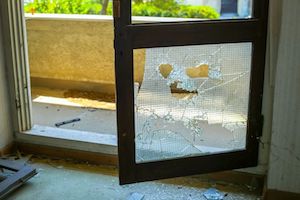North Carolina Criminal Law 14-54: Misdemeanor Breaking or Entering
 The crime of Misdemeanor Breaking or Entering under North Carolina Criminal Law 14-54 is a misdemeanor criminal offense characterized by a defendant, breaking or entering into a building that belongs to another person, without their consent, wrongfully or without right.
The crime of Misdemeanor Breaking or Entering under North Carolina Criminal Law 14-54 is a misdemeanor criminal offense characterized by a defendant, breaking or entering into a building that belongs to another person, without their consent, wrongfully or without right.
Sometimes the offense may also be informally referred to as: “B&E” or “Breaking and Entering.”
To prove a defendant committed the crime of Misdemeanor Breaking or Entering, the prosecutor must establish the following prima facie elements of the crime Beyond a Reasonable Doubt:
- There was a breaking by the defendant or entry by the defendant
- The place the defendant entered/broke into was, in fact, a building
- That the defendant was not given consent by the owner/tenant
- That the defendant entered wrongfully or without right.
“Breaking” does not always mean actual breaking (i.e. physically removing barriers like breaking a window).
Breaking can also be constructive, meaning it is still considered a breaking if the defendant entered a building by threat, force, trick, or fraudulent representation that caused another person to allow the defendant to enter.
“Entry” simply means that the defendant entered the building.
The “Building” that is entered can be any uninhabited house, dwelling, actual building or any structure that is made to ensure the property within remains secure.
2. Examples of Misdemeanor Breaking or EnteringThe defendant enters a random catholic church from an unlocked back door to escape the bad weather. The Defendant may be charged with Misdemeanor Breaking or Entering, a Class 1 Misdemeanor Offense.
The defendant breaks into a neighbor’s house while they were out of town in order to watch a movie on their new 65” television. The Defendant may be charged with Misdemeanor Breaking or Entering, a Class 1 Misdemeanor Offense.
The defendant helps a friend move into a new neighborhood that has a clubhouse for residents. The defendant goes back later that week, without telling his friend, and breaks into the clubhouse to use the gym and pool. The Defendant may be charged with Misdemeanor Breaking or Entering, a Class 1 Misdemeanor Offense.
3. Related OffensesOther related crimes offenses include:
- North Carolina Criminal Law 14-51: Burglary
- North Carolina Criminal Law 14-54: Felonious Breaking or Entering
- North Carolina Criminal Law 14-54.1: Felonious Breaking or Entering - Place of Religious Worship
- North Carolina Criminal Law 14-56: Breaking or Entering Into a Motor Vehicle
- North Carolina Criminal Law 14-72(A): Felonious Larceny - Goods Worth More Than $1,000
- Misdemeanor Breaking and Entering Law: NCGS 14-54
A Defendant may be able to challenge the crime of Misdemeanor Breaking or Entering with defenses such as: consent by the property owner for the entry, rightful entry, necessity, or mistake of fact.
5. PenaltiesUnder North Carolina Criminal Law 14-54: Misdemeanor Breaking or Entering is a Class 1 Misdemeanor offense, allowing for a maximum period of incarceration of up to 120 days.
The Misdemeanor Punishment Chart provides for Active, Intermediate, and Suspended punishments.
Additional terms and conditions punishment may include:
- Enrollment into and completion of a cognitive behavioral program
- Costs of Court
- Restitution
- Civil judgment for damages
- Fines
- Community service
- Supervised and unsupervised probation
 If you have been charged or arrested for Misdemeanor Breaking or Entering, call our Charlotte criminal defense attorneys without delay.
If you have been charged or arrested for Misdemeanor Breaking or Entering, call our Charlotte criminal defense attorneys without delay.
A conviction for crimes involving larceny, theft, and crimes of dishonesty and moral turpitude can carry consequences to reputation in the community and can have a long-lasting impact on your employment, the ability to rent or purchase a home, and other financial prospects.
If you’ve Googled “Attorneys Near Me” and you have been accused and/or charged in the Charlotte-Metro region, CALL NOW: 704-342-4357
Our criminal lawyers provide help to people in Charlotte-Mecklenburg (Charlotte, Matthews, Pineville, Davidson) as well as Gaston County (Gastonia, Belmont), Iredell County (Mooresville and Statesville NC), Lincoln County (Lincolnton), and Union County (Monroe, Waxhaw, Mint Hill, Marshville, Indian Trail, Fairview, Mineral Springs, Weddington, Stallings, Wingate, and Stallings)
Helpful Information About Criminal Charges Powers Law Firm PA Home
Powers Law Firm PA Home


















